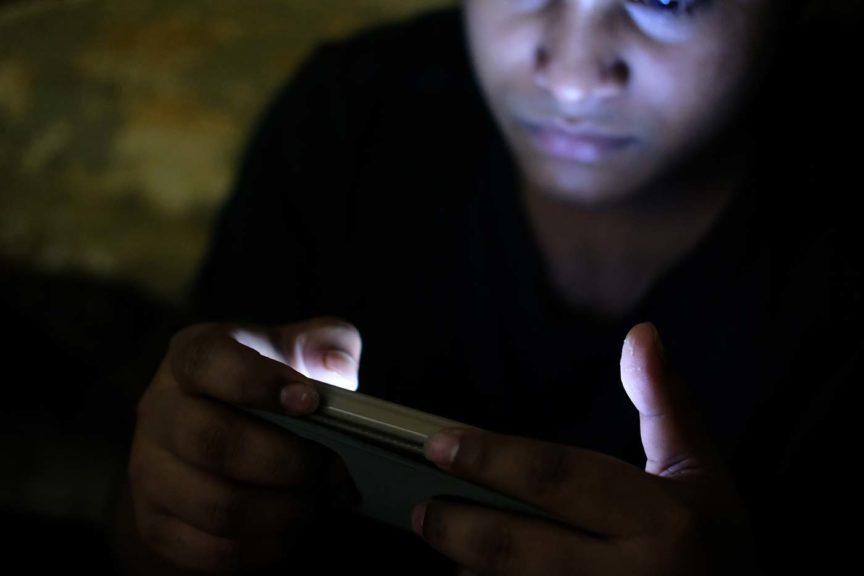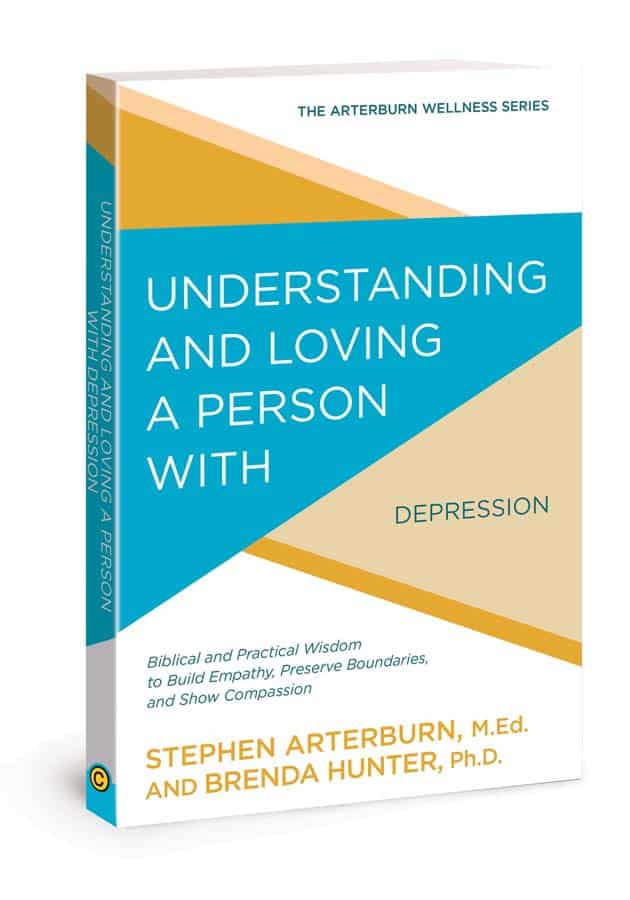Few things are more frightening to a parent or ministry leader than having a depressed teenager.
Sensitive parents and leaders live each day conscious of the culture young people swim in with its smartphones, Xboxes, social media, gender confusion, and steady rollout of sex and violence on television and in movies.
Add to the mix heavy academic pressure that becomes especially intense in eleventh and twelfth grades, with its accompanying sleep deprivation, and it’s easy to have an unhappy kid.
So when Scott goes silent, loses weight, spends too much time alone, and almost always looks unhappy, his mother may ask herself if his life is just too stressful or if he is depressed?
Or when a pastor hears fifteen-year-old Sarah talk about feeling friendless, that pastor worries. Is Sarah just experiencing typical adolescent mood swings, or is she depressed?
Teen Depression? Or Normal Adolescence?
Even therapists sometimes have difficulty figuring out if a teenager is depressed or just swamped with all the developmental changes that occur in adolescence.
After all, these are the years in early adolescence that hormones kick in and the self-consciousness of middle school breeds angst. In addition, adolescents are bombarded by so much more today than forty or fifty years ago. Adolescents today must cope with radical changes in American culture, and it sometimes takes a significant toll.
Social Media

One of the transformative factors in a teenager’s life today is social media. Janis Whitlock, director of the Cornell Research Program on Self-Injury and Recovery, believes the epidemic of mood disorders for teens is driven less by what’s happening in the culture than by technology and social media. She says, “It’s that they’re in a cauldron of stimulus they can’t get away from, or don’t want to get away from, or don’t know how to get away from.” (Quote from Susanna Schrobsdorff’s Time article Teen Depression and Anxiety: Why the Kids Are Not Alright).
It may be hard for you as an adult to understand the ramifications of technology in children’s lives. Not only can children not escape technology, but it exposes them to everything sexual and predatory while promising them friendship and intimacy it cannot deliver.
This loss of intimacy in human relationships in American culture has been profound. The loss can be seen in marriages, in parent-child relationships, and often in friendships.
Technology makes eye contact or face-to-face encounters even harder, often leaving kids feeling lonely and empty inside. This is especially true since teens often do not understand that the “friendship” they experience on Facebook is illusory. Sometimes, even as they stare at their screens, searching avidly and frequently for messages from friends, they may feel sad and empty inside.
This sadness—this inability to have an intimate, nourishing, and real encounter with another person—can lead to anxiety and depression.
Warning Signs
So how can you tell if a teenager is depressed? According to the Mayo Clinic, a sensitive and observant person should look for the following warning signs when a teen appears lost and unhappy. Is the teen
- talking or writing about suicide?
- withdrawing from friends and family?
- experiencing mood swings?
- using alcohol or drugs?
- feeling hopeless?
- changing eating and sleeping patterns?
- giving away belongings?
- acting severely anxious and agitated? (See Teen Suicide: What Parents Need to Know.)
If a teen displays some or all of these warning signs, it’s important to take these signs seriously and not discount them as moodiness or assume tomorrow will be a better day.
When you identify these signs as a ministry leader, now is the time to recommend an empathic therapist who is trained in working with adolescents. Pronto.
Suicide Rates and Your Students
Why this alarm? Suicide rates have risen for teens in America. According to the Centers for Disease Control and Prevention (CDC), suicide rates have risen 200 percent since 1999 for girls ages ten to fourteen. Suicide rates for males were also higher in 2014 than in 1999 for all age groups younger than seventy-five. (See Sally C. Curtin, Margaret Warner, and Holly Hedegaard’s data in Increase in Suicide in the United States, 1999–2014.)
Because adolescents are often impulsive and immature, the danger of suicide may be real depending on the severity of the depression. The Centers for Disease Control and Prevention Youth Risk Behavior Surveillance survey released in June of 2016 reported that nationally, some 17.7 percent of American students seriously considered attempting suicide in the previous twelve months. More females (23.4 percent) than males (12.2 percent) had seriously thought about killing themselves. The group with the highest percentage was ninth-grade girls (26.5 percent). (Data from Centers for Disease Control and Prevention, “Youth Risk Behavior Surveillance—United States, 2015,” Morbidity and Mortality Weekly Report: Surveillance Summaries 65, no. 6 [June 10, 2016].)
Imagine that—a fourth of the ninth-grade girls surveyed had wanted to die. While experts suggest that the reasons for this dramatic upsurge in suicide for ten- to fourteen-year-old girls are the stagnant economy, earlier puberty, and cyberbullying, among others, I would like to suggest that something else is going on.
Imagine that—a fourth of the ninth-grade girls surveyed had wanted to die.
It’s Hard to Be a Girl Today

Last winter, I (Brenda) was coming out of Nordstrom and saw a beautiful girl with long black hair, stylish clothes, and the latest boots sitting on a bench. We struck up a conversation about just how hard it is to find clothes we like that suit our actual bodies, and soon we drifted into why it’s hard to be female in this culture.
She said softly, “It’s hard to be a girl today. You have to wear the right clothes; your hair needs to look a certain way. You have to get into the right college, be on social media, and please your parents. And when you go to college, there’s the pressure to hook up. A girl does it, and sometimes she drinks to be able to do it because she thinks she will lose her boyfriend if she doesn’t have sex with him. But she loses him anyway. And then she cries.”
As I drove off, I agreed with her. It is hard to be a girl today. From middle school through college, girls in America have so many pressures on them to be smart, hang with the popular kids, and have sex. Moreover, they must please their parents by getting into the right college or university.
It’s overwhelming. It can be devastating. Apparently, ninth-grade girls feel this keenly.
Academic Pressure

Sometimes our kids just can’t cope with all the social and academic pressure they feel as they build resumes for college admission.
Hanna Rosin wrote an article for the Atlantic Monthly entitled “The Silicon Valley Suicides” about the suicides at Henry M. Gunn High School, a school of 1,900 students in California. Over a period of nine months starting in the spring of 2009, three Gunn students had killed themselves, as had one incoming freshman and one recent graduate. Another recent graduate had hanged himself.
Gunn and another high school, Palo Alto High, reported a suicide rate between four and five times the national average over a ten-year period.
What kind of community do Gunn students come from? Looking at the student body, 74 percent have at least one parent with a graduate degree. These are high-achieving parents. And every year, a number of Gunn students go to Stanford and University of California schools—in particular, Berkeley. These kids are among the best and brightest in the nation.
Rosin asks, “Had parents really given their kids the idea that they had to perform? That their love had to be earned with A’s and Advanced Placement tests and trophies? They hadn’t meant to.” Yet, as Rosin writes, academic pressure can cause anxiety and depression, which have been linked to suicide.
When academic pressure exists without emotional closeness, it can be a potentially lethal mix.
If You Think a Student Is Depressed
Encourage the family get professional help

If you think a student in your ministry is depressed, encourage the parents to have him or her evaluated by a psychiatrist who can prescribe an antidepressant.
Since I, as a psychologist, cannot prescribe medication, I spoke with North Carolina psychiatrist Dr. Collette Ah-Tye, board certified in both adult and adolescent psychiatry, about treating adolescent depression. “My patients are possibly suicidal when they get to me,” she says. “They have often been depressed for a year or two, so I feel blessed to have SSRIs to prescribe.”
And what about the parents? Ah-Tye encourages parents to get support while their teenager is in therapy, particularly if they are worried about suicide risk. When asked about ways parents can help, she says that once they get professional help for their child, they should consider getting help for themselves.
Practice unconditional love
As a ministry leader, it’s important that you model unconditional love for the kids and families you serve. Any time you marry love and acceptance with performance, you are headed for trouble.
Kids who feel loved for who they are and not for their accomplishments or admission to elite colleges are emotionally secure and resilient. These are the kids who can experience setbacks, sleep on it, and bounce back in the morning.
Kids who feel loved for who they are and not for their accomplishments or admission to elite colleges are emotionally secure and resilient.
You cannot take the place of a parent’s unconditional love, but you can make a difference by valuing your students simply for who they are.
Be present
As you serve kids, ask them about their days. Check in on their lives and emotional states. Make it safe for students in your ministry to tell you about their worries and concerns.
Often when kids cut themselves, they live in families where they cannot discuss negative feelings, so the cutting temporarily relieves psychological pain. When parents or other caring adults take time to listen to any hurts, troubles, or worries, it can prevent a world of trouble.
Model wise use of screen time
Experts who work with kids say that smartphones keep kids “hyperconnected” and “overexposed,” and this can create great anxiety. Consider the example you are setting in your own use of technology. Understand that you cannot ask for anything from your students that you are unwilling to do yourself.
Encourage friendships
A 2017 study of 123 middle schoolers, as well as parents and teachers, found that when parents gave their daughters strategies for finding friends—such as joining a school club with kids who had similar interests—they developed stronger friendships. (See Sue Shellenbarger’s Wall Street Journal article Advice on Helping Teen Girls Thrive.)
As a ministry leader, you are in an ideal position to foster friendships among the students you serve. Don’t underestimate the importance of real-life connections!

If someone you love is depressed, you probably feel confused, angry, and helpless. This encouraging guide will help you hold on to hope while broadening your understanding of depression and its treatment. In this book you will explore:
- The multiple causes of depression
- How men and women react to depression differently
- The influence of social media and technology on depression
- The unique challenges of depression in adolescence
- How to take care of yourself while caring for someone who is depressed
Light can overcome the darkness of depression. You can get back the person you love. Learn how to care for both of you in this hope-filled book.
Heart of the Matter
It takes a lot of thought, sensitivity, diligence, and sacrifice to raise a child who is psychologically healthy, honest, hardworking, and brave. Of course, parents can’t do it all on their own. They need God’s help.
In your role as a student leader, you can be a key part of God’s provision for families. Ultimately, if your students have genuine faith in Christ, they will be better able to face the world with strong core values, resilience, and inner strength.
We have talked about several aspects of depression, but there’s a dimension that we have yet to explore in greater depth. In other words, it’s time to deal more fully with the heart of the matter.
Drugs alone do not eradicate the darkness
When a student is struggling with depression, I strongly encourage families to seek the help of a psychiatrist who can prescribe the correct medication. While antidepressants may be of great help, drugs alone cannot eliminate the darkness.
Dr. David Allen, a psychiatrist who practices in the Bahamas, understands the spiritual components of depression and says that drugs do not banish the darkness completely. “With drugs we can rearrange chemicals in the brain, but we cannot touch a person’s loneliness and isolation,” he said.
I believe it is in the spiritual realm that the darkness of depression can be best understood and ultimately banished.
It requires Christ and the cross.
On the cross, Christ experienced a terrifying darkness beyond the pale of human experience when He cried, “My God, my God, why have you forsaken me?” We cannot begin to imagine what He felt. His was a sense of horrific pain and cosmic despair, compounded by the terrible realization of God’s absence in those acute moments when He bore the weight of the sins of the world. For a brief time, He experienced intrinsic darkness. But one of the results of this was and is His ability to identify with us when we are lost in our sins and grief.
Spiritual practices for depression

Along with meditating on the cross of Christ, depressed students may benefit from practicing Confession and receiving Absolution. These ancient liturgies speak to both heart and mind, allowing one to release unspoken pain and receive assurance of Christ’s love and forgiveness.
If you can, pray with the depressed student in your life. If she isn’t willing, you can pray for her and her inner healing.
John Rice, a retired Anglican priest who has himself suffered from clinical depression, often prays for the depressives who come to his workshops on prayer and healing. When this warm-hearted priest prays aloud, his hands lightly touching the petitioner’s shoulders, he asks God to lift the darkness. He says it is rare for the depressive not to experience some relief after healing prayer. Rice adds that forgiveness “is the key to healing—it unlocks the door” and begins to banish the darkness. Rice says that depression and its accompanying darkness rob us of joy, “yet Jesus wants us to have joy because we are God’s beloved sons and daughters.”
Through your ministry, you too can lead students to encounter the cross as a way of coming out of the darkness and moving into the light of God’s love for them.
What a privilege! Let’s begin.
Content adapted from Understanding and Loving a Person with Depression by Stephen Arterburn and Brenda Hunter, © 2017. Used by permission of David C Cook. May not be further reproduced. All rights reserved.








